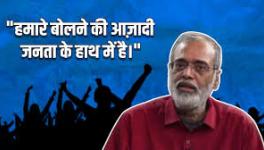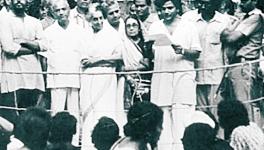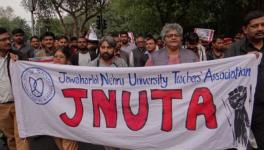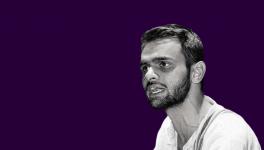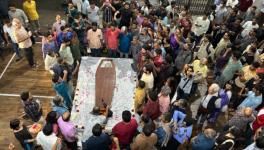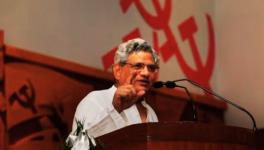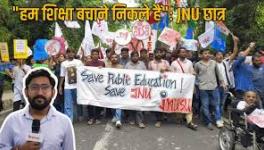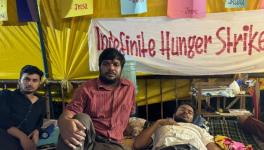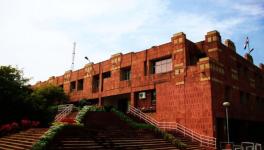Umar Khalid Completes 1,000 Days Behind Bars: Trial Really of the Justice System
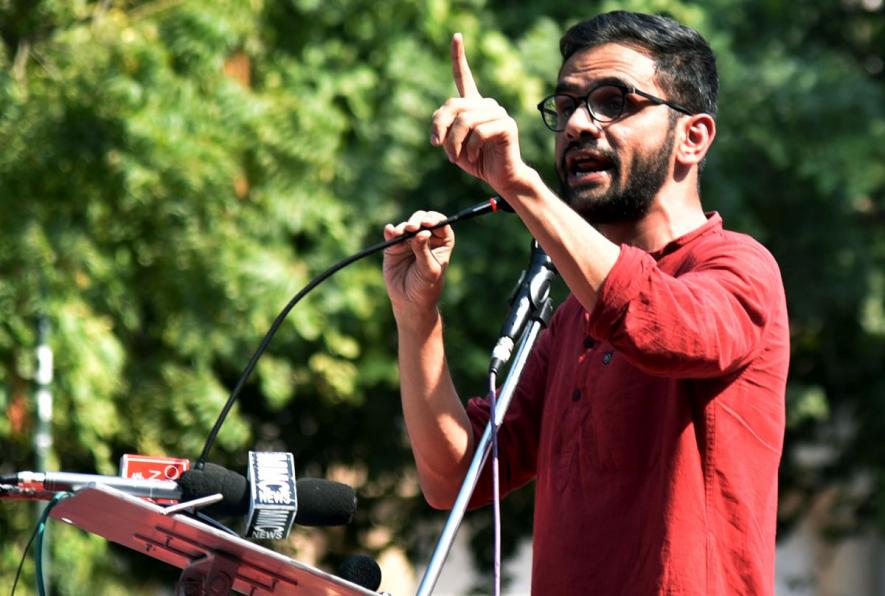
Image credit: The Leaflet
“These 1,000 days are not just about Umar but they also mark 1,000 days of shame for the Indian justice system,” said independent journalist Ravish Kumar at a public meeting organised by a group of activists, journalists, and advocates to mark 1,000 days of student-activist Dr Umar Khalid’s incarceration.
Dr Khalid was arrested on September 13, 2020, under the draconian anti-terrorist legislation Unlawful Activities Prevention Act, 1967 (UAPA), on allegations of hatching a larger conspiracy of North East Delhi riots of February 2020. Since then, he remains an undertrial prisoner who has been consistently denied bail.
The public meeting ‘Democracy, Dissent & Censorship: A Discussion by Concerned Citizens’ was organised at the Press Club of India (PCI) on 9 June. Apart from Kumar, Supreme Court advocate Shahrukh Alam, Rashtriya Janata Dal member of Parliament Manoj Jha, professor at Jawaharlal Nehru University (JNU) Prabhat Patnaik, and Dr Khalid’s father Dr S.Q.R. Ilyas also spoke at the event. The discussion was moderated by author and activist Gurmeher Kaur. Author and activist Arundhati Roy was also present at the event.
Interestingly, the original venue of the event was the Gandhi Peace Foundation. However, the IP Estates police station ordered the foundation to cancel the booking of the event. A letter was handed over to the foundation by two police officers, which stated that the police had received discrete inputs of disturbance of the law and order situation as reported by Scroll.in.
The venue was then changed to the Press Club of India (PCI). Commenting on the last-minute change of venue, Kumar said: “Public spaces to discuss issues related to the health of democracy are shrinking constantly.”
Even Shahrukh Alam pointed out that there was no legal basis on which the foundation was asked to cancel the booking for the public meeting.
Dr Khalid, who holds a doctorate degree from JNU, has been accused of being one of the “masterminds” for planning a conspiracy to instigate violence and terrorism-related activities in the Delhi riots.
According to the chargesheet filed by the Delhi police, Khalid delivered an inflammatory speech in Amravati, Maharashtra, a week before the riots broke out in northeast Delhi, in connection with the Citizenship (Amendment) Act, 2019 (CAA) and the proposed National Register for Citizens (NRC).
Apart from Dr Khalid, Delhi police have booked 17 others, namely Athar Khan, Asif Iqbal Tanha, Devangana Kalita, Gulfisha Fatima, Ishrat Jahan, Khalid Saifi, Meeran Haider, Mohammad Faizan Khan, Natasha Narwal, Safoora Zargar, Saleem Khan, Salim Malik, Shadab Ahmed, Sharjeel Imam, Shifa-ur-Rehman, Tasleem Ahmed and Tahir Hussain in the case.
Revisiting the Delhi riots
On February 23, clashes broke out in northeast Delhi between supporters of CAA and those protesting against it. Schools, shops, commercial establishments and places of worship were attacked.
As per a report of the independent fact-finding committee titled Uncertain Justice: A Citizens Committee Report on the North East Delhi Violence 2020, the communal violence spread in the backdrop of the anti-CAA protests protests and turned into widespread riots. Over the next few days, hundreds were left injured and over 53 died. The Delhi police arrested 1,300 people in over 758 cases.
The report, prepared by a committee led by former Supreme Court Justice Madan B. Lokur, indicated that the triggering point of the riots was the implementation of CAA on December 12, 2019. It induced fear amongst the Muslim community over the possibility of a loss of citizenship stemming from the combined effect of the implementation of CAA and potential exclusion from NRC.
The CAA amended the Citizenship Act, 1955, and only allowed Hindu, Sikh, Buddhist, Jain, Parsi or Christian migrants from Afghanistan, Bangladesh or Pakistan, who have entered India on or before December 31, 2014, to apply for citizenship of India.
The protests coincided with the Delhi assembly elections of February 2020, where divisive narratives such as framing anti-CAA protestors as anti-national and violent were spread by several political leaders, especially Bharatiya Janata Party (BJP) leaders Kapil Mishra, Anurag Thakur and Parvesh Verma. In one of the rallies, Thakur instigated the participants to raise incendiary slogans. When he said, “Desh ke gaddaron ko (the traitors of the country), the crowd responded “goli maaro saloon ko (shoot them).” Gaddar was apparently a reference to the anti-CAA protestors.
The crowd’s response was a throwback to the statement first made by Mishra during a pro-CAA march in the city’s Connaught Place on December 20, 2020 when Section 144 of Code of Criminal Procedure was imposed.
On February 23, 2020, Mishra called a pro-CAA rally at Maujpur traffic signal, close to Jafrabad metro station where at least 500 people were staging protest against CAA and gave a three days ultimatum to the Delhi police to remove the protestors blocking the traffic at Jafrabad and nearby roads. He warned that he will not let another ‘Shaheen Bagh’ be created in Delhi. In the evening, stone pelting incidents were reported near Maujpur.
BJP leader and member of Parliament from West Delhi, Parvesh Verma used another favourite trope of the Hindu Right, the alleged treatment meted out to Kashmiri Pandits by Kashmiri Muslim to rile up the crowd against the protestors. He said, “They will enter your house … abduct your sisters and mothers, rape them, kill them the way militants had treated Kashmiri Pandits.”
He added, “Lakhs of people gather there (Shaheen Bagh) and this fire can anytime reach households of Delhi … people of Delhi need to think about it and decide … that’s why today is the moment.”
Another trigger for the widespread protests was the attack on students of Jamia Millia Islamia by the Delhi police. On December 15, 2019, police entered the university campus and detained more than a hundred students for their alleged involvement in the violent protests against CAA. As a result of a clash between the student protestors and the police, many students and police personnel were injured and 15 people were arrested.
Charges against Khalid
Two first information reports (FIRs) were filed against Dr Khalid. In one of the FIRs (FIR no. 59/2020), charges under Sections 147 (punishment for rioting) and 148 (rioting, armed with deadly weapons), 149 (every member of unlawful assembly is guilty of the offence committed in prosecution of common object) and 302 ( punishment for murder) of the Indian Penal Code (IPC), along with charges under Sections 13 ( punishment for unlawful activities), 16 (punishment for terrorist act) and 18 (punishment for conspiracy) of the UAPA have been framed against him and 17 others.
Charges under the Arms Act, 1959 for the use of arms during riots have also been framed against him. Additional charges under Sections 124A (sedition) and 153A (promotion of enmity between groups on the ground of religion, race, place of birth, residence etc.) of the IPC were also framed by the Delhi police in 2021.
In another FIR (FIR no. 101), Dr Khalid, along with Hussain and Saifi, has been accused of vandalism and arson in northeast Delhi’s Khajuri Khas. This FIR was registered on the grounds that he was part of a large crowd at Khajuri Khas that was pelting stones on police and setting nearby vehicles on fire.
While he was granted bail in the second FIR by a sessions court in Delhi in April 2021, he continues to be denied bail in the larger conspiracy case. The additional sessions judge who granted bail to Dr Khalid in the second FIR reasoned that Dr Khalid cannot remain imprisoned on the basis of “sketchy materials” against him as it could not even be proved that he was physically present at the crime scene.
This same principle has also been invoked recently in the acquittal of Noor Mohammad, who was one of the accused persons in the 758 FIRs filed by the Delhi police. The court pulled up the Delhi police for falsely citing the complainant as a witness who could identify Mohammad as the offender. Mohammad was accused of the offence of rioting and unlawful assembly in the Delhi riots.
But this is not the first time serious questions have been raised against the Delhi police. Many videos and accounts emerged online that highlighted the complicity of the Delhi police during the riots. There were videos of police directly breaking CCTV cameras at protest sites, directing stone-pelting mobs, or simply pretending to look away while violence was being perpetrated right in front of them.
Nevertheless, Dr Khalid has been denied bail by Karkardooma sessions court in Delhi on March 24, 2022 in the first FIR. An appeal against the bail order was filed before the Delhi High Court on April 22, 2022.
The high court division Bench of Rajnish Bhatnagar and Siddharth Mridul denied bail to Dr Khalid on October 18, 2022 on the grounds that the allegations against him are prima facie true. The court remarked that the riots seem to have been prima facie orchestrated by Dr Khalid. He was part of “conspiratorial meetings” held from December 2019 to February 2020, and gave a provocative speech at Amravati. These acts depicted his “conspiratorial mindset”, the court held.
Of the 18 arrested, only five have been granted bail in the larger conspiracy case, Faizan Khan, Narwal, Kalita, Tanha and Zargar (granted bail on humanitarian grounds as she was pregnant).
While granting bail to Narwal, Kalita and Tanha, the court concluded that a prima facie case of terrorist activities and conspiracy is not made out against them. It remarked that in its “anxiety to suppress dissent, the State has blurred the line between the constitutionally guaranteed ‘right to protest’ and ‘terrorist activity’.”
By no means can allegations relating to inflammatory speeches and organising chakka jam be evidence of inciting violence that can be understood as a terrorist act under UAPA, the court remarked.
Political prisoner versus anti-national
While some people call Dr Khalid a political prisoner for dissenting against the government and its policies, others have declared him ‘anti-national’.
Anyone who is declared an anti-national has to go through a process that itself is punishment. Dreaded anti-terror laws make bail an exception, jail the norm, and justice a distant dream.
This is particularly true of the UAPA, which makes it impossible for a person to get bail because of the embargo created by Section 43D(5) of UAPA, despite the fact that it challenges the core constitutional principle of personal liberty.
But despite the statutory restriction, the Supreme Court in Union of India versus K.A. Najeeb (2021) held that the constitutional courts have the ability to grant bail when violation of fundamental rights has taken place. The court also held that prolonged incarceration is a violation of personal liberty protection under Article 21 (protection of life and personal liberty) of the Constitution.
Even as Dr Khalid remains an undertrial prisoner, there have been instances where his rights as an accused has been violated. One such instance was when he was brought handcuffed before the sessions court. An undertrial prisoner remains in the custody of the court throughout the proceedings and handcuffing can only be done when the court allows.
Then there is the matter of differential treatment of the accused on the two sides of the aisle. While Thakur has been promoted as a Cabinet minister and the other two BJP leaders who are accused in the Delhi riots continue to enjoy impunity, Dr Khalid and many of his fellow activist friends continue to languish in jail.
The Supreme Court has issued notice to the Delhi Police on Dr Khalid’s appeal against the Delhi High Court’s Order, which is listed after summer vacation.
It remains to be seen whether the law will finally take its course. While this is already a case of justice delayed, we can only hope that, unlike Father Stan Swamy, Dr Khalid will not be completely shut out of an audience with Lady Justice.
Gursimran Kaur Bakshi is a staff writer at The Leaflet.
Get the latest reports & analysis with people's perspective on Protests, movements & deep analytical videos, discussions of the current affairs in your Telegram app. Subscribe to NewsClick's Telegram channel & get Real-Time updates on stories, as they get published on our website.









